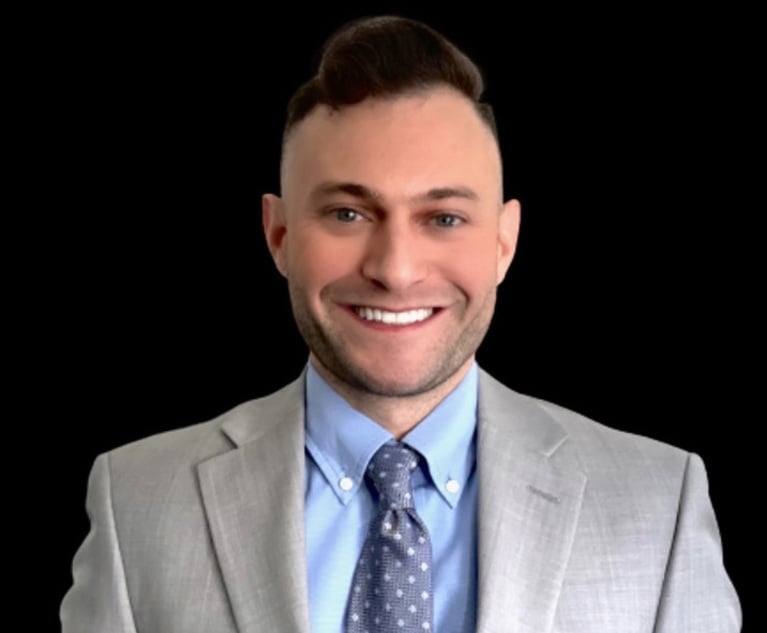 While corporate risk management and the legal department often overlap – 40% of GCs oversee risk, according to one survey– ultimate decisions about the insurance portfolio as a hedge against risk, however, are frequently made by executives who do not always consult with in-house counsel.
While corporate risk management and the legal department often overlap – 40% of GCs oversee risk, according to one survey– ultimate decisions about the insurance portfolio as a hedge against risk, however, are frequently made by executives who do not always consult with in-house counsel. Insurance & The C-Suite: How Corporate Counsel Can Mitigate Risk
Companies reduce their risk when their in-house legal teams and C-Suite executives are each actively involved in insurance portfolio management.
January 31, 2023 at 03:05 PM
4 minute read
The way in-house law departments interact with the companies they support is transforming. These days, corporate counsel work closely with C-suite executives to advise on wide-ranging issues, especially around risk. While corporate risk management and the legal department often overlap – 40% of GCs oversee risk, according to one survey– ultimate decisions about the insurance portfolio as a hedge against risk, however, are frequently made by executives who do not always consult with in-house counsel.
"Companies sometimes make decisions around the purchase of insurance without being able to read the complete policy or understanding what they've bought. That can lead to disastrous results," says Carrie M. Raver, a partner at Barnes & Thornburg and co-chair of its insurance recovery group. "I find that most often, GCs are the best decision-makers on what kind of insurance to procure."
The implications are real: Commercial premiums in 2023 are forecast to increase 10% across the board, with spikes as high as 25% or more in cyber insurance alone, according to the Risk Management Association. This is critical to remember when GCs are responsible for managing risk, but the CFO, CIO or COO are making decisions about insurance coverage.
Corporate counsel should play a significant role in influencing executive-level decision-making for procuring insurance policies and pursuing claims, adds Raver. In both instances, understanding policy provisions and developing best practices for executives who make final decisions about these complex contracts helps mitigates additional risk.
Understanding problematic provisions
 Carrie M. Raver, a partner at Barnes & Thornburg and co-chair of its insurance recovery group
Carrie M. Raver, a partner at Barnes & Thornburg and co-chair of its insurance recovery group
There are several problematic provisions in commercial policies that in-house counsel must ensure that C-suite executives know before making insurance policy decisions. The first revolves around choice-of-law in favor of New York, which is a notoriously difficult state for policyholders. "New York is not known for being policyholder friendly," Raver says. "Insurance companies choose this state even when neither party has any connection to New York whatsoever."
Similarly, insurance companies try to control the method of dispute resolution by writing arbitration clauses into their policies. Such policies should be scrutinized, says Raver. Other issues involve sublimit amounts of recovery – particularly in cyber coverage.
"Policyholders should get one limit of liability in their policy," Raver adds. "In a perfect world, GCs and executives would have time to work together to really read the policy to catch issues such as these before coverage is bound."
Raver points to a provision that roughly says contract ambiguities are to be construed in an "even-handed manner" and not against the drafter. "This turns basic insurance law on its head," she says. "Brokers sell standard-form policies to companies that aren't able to negotiate terms. If there's an ambiguity it should be construed against the insurance company."
Developing best practices
GCs must also work with the C-suite and create a "state of the company" discussion before renewals. "What does the company look like today? Have any recent changes created a new risk exposure?" says Raver. Discussions like these keep insurance top-of-mind.
GCs need to get up to speed on coverage issues or claims that their industry is commonly facing and discuss with outside counsel how – and when – to report them.
For Raver, it comes down to viewing insurance as an investment that can work when GCs understand a policy's provisions and create best practices that sync with the C-suite's needs. "Be prepared to spend money on insurance," she says. "But it also pays to assemble a strong team to face any issue that arises."
Barnes & Thornburg's Insurance Recovery and Counseling practice has additional information for in-house counsel about insurance and risk.
Johanna Marmon is a writer in upstate New York who has been reporting on trends impacting the legal industry for more than 15 years.
NOT FOR REPRINT
© 2025 ALM Global, LLC, All Rights Reserved. Request academic re-use from www.copyright.com. All other uses, submit a request to [email protected]. For more information visit Asset & Logo Licensing.
You Might Like
View All
'Pull Back the Curtain': Ex-NFL Players Seek Discovery in Lawsuit Over League's Disability Plan

Insurer Not Required to Cover $29M Wrongful Death Judgment, Appeals Court Rules

State High Court Bucks Trend Favoring Insurers, Sides With Restaurants Seeking COVID-19 Coverage

US Judge Dismisses Securities Litigation Against Insurance Underwriter
2 minute readLaw Firms Mentioned
Trending Stories
- 1Spalding Jurors Return $12M Verdict Against State Farm Insurance Client
- 2Special Series Part 3: The Statutory Guardrails Violate the Majority Vote Rule
- 3Fed Judiciary Panel Mulls Authority to Ban In-State Bar Admission Requirements
- 4Why Georgia's Latest Push to Curb Lawsuits Has Business Groups and Trial Lawyers at Odds
- 5'Another Broken Promise': California Tribes Sue Casinos for Allegedly Illegal Profit From Card Games
Who Got The Work
Michael G. Bongiorno, Andrew Scott Dulberg and Elizabeth E. Driscoll from Wilmer Cutler Pickering Hale and Dorr have stepped in to represent Symbotic Inc., an A.I.-enabled technology platform that focuses on increasing supply chain efficiency, and other defendants in a pending shareholder derivative lawsuit. The case, filed Oct. 2 in Massachusetts District Court by the Brown Law Firm on behalf of Stephen Austen, accuses certain officers and directors of misleading investors in regard to Symbotic's potential for margin growth by failing to disclose that the company was not equipped to timely deploy its systems or manage expenses through project delays. The case, assigned to U.S. District Judge Nathaniel M. Gorton, is 1:24-cv-12522, Austen v. Cohen et al.
Who Got The Work
Edmund Polubinski and Marie Killmond of Davis Polk & Wardwell have entered appearances for data platform software development company MongoDB and other defendants in a pending shareholder derivative lawsuit. The action, filed Oct. 7 in New York Southern District Court by the Brown Law Firm, accuses the company's directors and/or officers of falsely expressing confidence in the company’s restructuring of its sales incentive plan and downplaying the severity of decreases in its upfront commitments. The case is 1:24-cv-07594, Roy v. Ittycheria et al.
Who Got The Work
Amy O. Bruchs and Kurt F. Ellison of Michael Best & Friedrich have entered appearances for Epic Systems Corp. in a pending employment discrimination lawsuit. The suit was filed Sept. 7 in Wisconsin Western District Court by Levine Eisberner LLC and Siri & Glimstad on behalf of a project manager who claims that he was wrongfully terminated after applying for a religious exemption to the defendant's COVID-19 vaccine mandate. The case, assigned to U.S. Magistrate Judge Anita Marie Boor, is 3:24-cv-00630, Secker, Nathan v. Epic Systems Corporation.
Who Got The Work
David X. Sullivan, Thomas J. Finn and Gregory A. Hall from McCarter & English have entered appearances for Sunrun Installation Services in a pending civil rights lawsuit. The complaint was filed Sept. 4 in Connecticut District Court by attorney Robert M. Berke on behalf of former employee George Edward Steins, who was arrested and charged with employing an unregistered home improvement salesperson. The complaint alleges that had Sunrun informed the Connecticut Department of Consumer Protection that the plaintiff's employment had ended in 2017 and that he no longer held Sunrun's home improvement contractor license, he would not have been hit with charges, which were dismissed in May 2024. The case, assigned to U.S. District Judge Jeffrey A. Meyer, is 3:24-cv-01423, Steins v. Sunrun, Inc. et al.
Who Got The Work
Greenberg Traurig shareholder Joshua L. Raskin has entered an appearance for boohoo.com UK Ltd. in a pending patent infringement lawsuit. The suit, filed Sept. 3 in Texas Eastern District Court by Rozier Hardt McDonough on behalf of Alto Dynamics, asserts five patents related to an online shopping platform. The case, assigned to U.S. District Judge Rodney Gilstrap, is 2:24-cv-00719, Alto Dynamics, LLC v. boohoo.com UK Limited.
Featured Firms
Law Offices of Gary Martin Hays & Associates, P.C.
(470) 294-1674
Law Offices of Mark E. Salomone
(857) 444-6468
Smith & Hassler
(713) 739-1250








